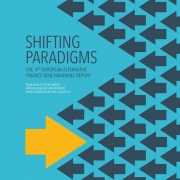Current State of Crowdfunding in Ireland 2016
An overview

Inhabitants: 6,38 million
GDP (ppp) per capita: $47,329
(Source: Wikipedia; Image Credit: NuclearVacuum)
Through recent financial crises Irish businesses, charities and artists have looked to crowdfunding to overcome challenges in financing projects and ideas (Kennedy, 2011). In recent years there has been increased interest from organisations in the area of crowdfunding both at a public and private level. Several noted crowdfunding platforms can be found both in The Republic of Ireland and Northern Ireland such as ‘iCrowdfund’ and ‘Seedups’ (Coyne, 2016, Faulkner, 2016). Furthermore, public sponsored research has looked at the prospect of using crowdfunding in Ireland to assist national scientific research funding agencies (Cullina et al., 2014).
Volumes
Between 2011 and 2014 two of the main national Irish crowdfunding platforms (Fundit and iDonate) reported throughput of 2-3 million euros each. Recent industry figures have shown further growth in the sector since 2014.
Local platforms
FundIt.ie (donation and reward) is run by Business to Arts, a not-for-profit organisation working to support resilience and transformation in the cultural sector. FundIt is presently supported by The Bank of IrelandiCrowdFund.ie (donation and reward) was launched in 2014. It is a module of iDonateConnect, which supports over 1400 non-profit organisations in Ireland with fundraising initiatives.
Foreign platforms
CoFunder; (peer2peer) finds its origins in SeedUps and has operations in Ireland, the UK and USA. CoFunder provides peer-to-peer lending to growth based companies looking to expand but who lack the capital to do so.
Indiegogo and Kickstarter also operate in Ireland.
Regulations
From a legislative perspective the rules and regulations that apply nationally are at a formative stage. There has been an absence of regulation treating crowdfunding as a distinct means of raising finance for several reasons. Firstly, crowdfunding as a domain has only recently gained traction with the term ‘crowdfunding’ arising circa 2006 (Sullivan, 2006). Secondly, existing national legislation covers the ambit of many types of crowdfunding presently used in Ireland. Accordingly, there is no present pressure from organisations for new laws covering existing models in use. Thirdly, many Irish businesses still prefer traditional financing methods over crowdfunding. However, this situation could change in the near future.
The four main types of crowdfunding namely rewards, donation, equity and lending are covered by various pieces of existing national/European legislation/regulation. In Ireland at present there is evidence of the predominant use of the rewards, donation and lending models. To date there has been some interest and research in crowdfunding on the part of The Central Bank of Ireland who have issued a consumer notice on crowdfunding including peer-to-peer lending (Central Bank of Ireland, 2015). This could ultimately lead to bespoke legislation in the area where it has been highlighted by the Central Bank that certain consumer protections cannot be presently availed of.
Presently, several core pieces of legislation directly and indirectly apply to aspects of crowdfunding in Ireland;
The Companies Act, 2014 prohibits a private company from issuing securities to the public save for specific exemptions (Ireland, 2014). Any companies involved in such offers to the public will fall under the scope of the Companies Act (and amending) legislation. Accordingly, companies that use crowdfunding in such circumstances need to be mindful of this legislation and of any on-going legislative changes. The provisions regarding exemptions within the Companies Act can change, in some instances, on an annual basis.
Banks
Crowdfunding initiatives that act as “banking businesses” are regulated by the Central Bank Act of 1971 (Ireland, 1971). Furthermore, businesses that are involved in acting as “investment firms” or in the business of “payment services” are guided by the Markets in Financial Instruments Directive (MiFID), Payment Services Directive (PSD) and their amending legislation respectively (European Council, 2008, European Council, 2007). In these contexts the Central Bank of Ireland has regulatory and supervisory roles.
In conclusion, there are two immediate observations regarding the present state of crowdfunding in the Republic of Ireland. Firstly, it is posited that due to perceived risk and lack of regulation, equity crowdsourcing has yet to find traction in the Irish market. Secondly, the question remains as to whether or not other non-equity types of crowdfunding require specific legislative provision in Ireland. Crowdfunding initiatives that are not engaged in offering “investment” or “payment” services within the meaning of the directives do not face the same level of regulatory requirements. This seems to be the case for many Irish crowdfunding initiatives operated by charities and philanthropic organisations. While there are other regulatory issues regarding crowdfunding the aforementioned legislative provisions cover the bulk of concerns faced by many crowdfunding initiatives in Ireland. As stated the Central Bank have publically expressed their concerns (Central Bank of Ireland, 2015) from the consumer perspective. Lastly, a recent public report has stated that “(in) order to set the conditions for SMEs in the creative economy to thrive; the Government should examine how to regulate the crowd-funding sector to afford better protection to both lenders and businesses”.
Our expert
“Equity based crowdfunding for SME’s has huge potential in Ireland, but the Central Bank needs to be supportive of the process.“
The Current State of Crowdfunding in Ireland is made possible by the contribution of Eoin Cullina
What is the potential of crowdfunding in your country?
A recent survey by Irish Venture Capital Association VenturePulse in 2014 concluded that Irish start-ups and SMEs raised €401 million from investors that year. This figure showed growth of 41 per cent over the previous year. Accordingly, it is posited that where Ireland has a strong track record of VC investment similar SME crowdfunding initiatives should grow in parallel.
What is the biggest challenge?
The biggest challenges facing equity and lending crowdfunding in Ireland are regulatory challenges. Both the Central Bank of Ireland and a government Joint Committee on Jobs, Enterprise and Innovation have presented observations on legislation in the area of crowdfunding.
What is the future holding for Ireland?
Based upon present growth in technology and the sciences in Ireland crowdfunding can play a critical role in supporting the growth of innovation in the SME sector.
DISCLAIMER: This document presents as a general overview of crowdsourcing in Ireland and is in no way to be construed as legal advice.
Central Bank of Ireland (2015), “Consumer Notice on Crowdfunding, including Peer-to-‐Peer Lending”.
Coyne, P. (2016), “iCrowdfund‐Flexible Online Crowdfunding”.
Collina, E., Morgan, L. and Conboy, K. (2014), “The Development of a Public/Private Model for the Crowd-funding and Crowdsourcing of Scientific Research Projects”,SIG Prag.
European Council (2007), “On payment services in the internal market amending Directives 97/7/EC, 2002/65/EC, 2005/60/EC and 2006/48/EC and repealing Directive 97/5/EC”.
European Council (2008), “Amending Directive 2004/39/EC on markets in financial instruments, as regards the implementing powers conferred on thE Commission”, 2008/10/EC.
Faulkner, M. (2016), “Seedups‐ Intelligent Crowdfunding”.
Ireland (1971), “The Central Bank Act”, Dublin, Stationery Office.
Ireland (2014), “The Companies Act”, Dublin, Stationery Office.
Ireland (2015), “Report on hearings in relation to Examining the Potential for Job Creation, Innovation and Balanced Economic Development in the Creative Economy”, Joint Committee on Jobs, Enterprise and Innovation, Dublin, Stationery Office.
IVCA (2016), “Irish Venture Capital Association”, Website: http://www.ivca.ie, Accessed 7 March 2016.
Kennedy, J. (2011), “The crowdfunding revolution kickstarts a new economic hope”, Silicon Republic.
Sullivan, M. (2006), “Historical Crowdfunding Examples”, Fundavlog.









